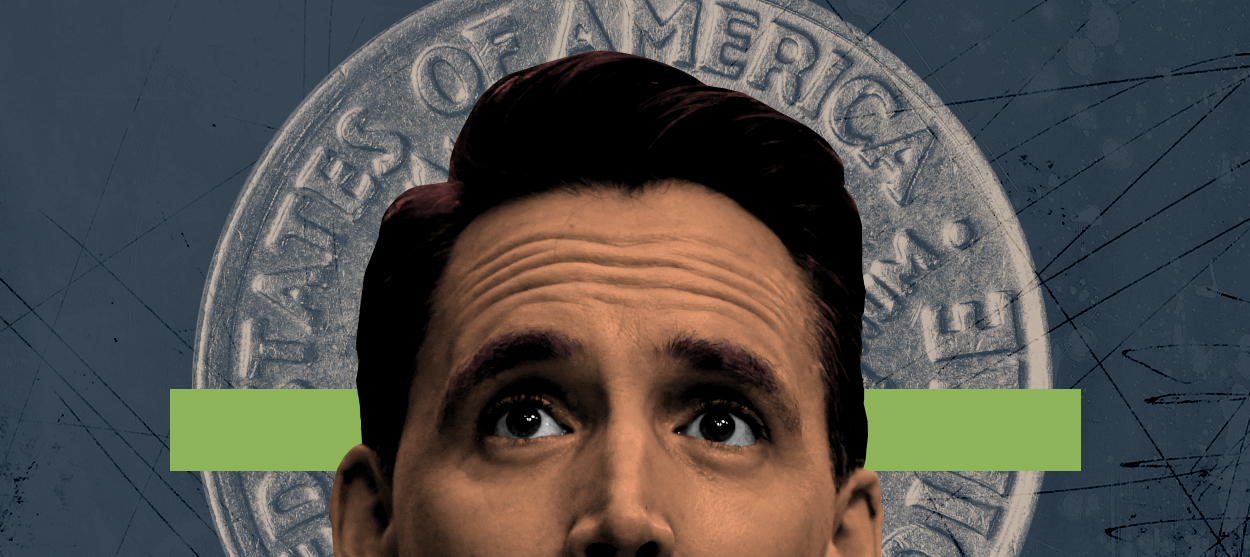What Josh Hawley's minimum wage proposal has in common with his election lies
The truth about the Missouri Republican's "Blue-Collar Bonus"


A free daily email with the biggest news stories of the day – and the best features from TheWeek.com
You are now subscribed
Your newsletter sign-up was successful
Sen. Josh Hawley (R-Mo.) has a new "minimum wage" pitch, just in time to help gloss over his support for the January 6 insurrection.
The senator's so-called "Blue-Collar Bonus" is being credulously described by some in the press as "breaking with the mainstream GOP orthodoxy" and "moving in the right direction."
But from a policy perspective, his proposal reflects the exact same faux-populist propaganda of his election lies. It's a pose that panders to the GOP working-class base without actually doing anything for them.
The Week
Escape your echo chamber. Get the facts behind the news, plus analysis from multiple perspectives.

Sign up for The Week's Free Newsletters
From our morning news briefing to a weekly Good News Newsletter, get the best of The Week delivered directly to your inbox.
From our morning news briefing to a weekly Good News Newsletter, get the best of The Week delivered directly to your inbox.
Hawley promises government cash for any worker making less than $16.50 per hour, with the federal government paying half the difference between that and their current pay. Large employers making $1 billion or more in annual revenues would have to pay a straight-up $15 per hour minimum wage. Sounds great, right?
Except the outcome is a corporate giveaway masquerading as pro-worker policy, with terrible incentives that will encourage many employers to lower worker pay.
- An employer currently paying $15 per hour would have every reason to cut all employees' pay by $1.50/hr down to $13.50/hr. Since the worker is now making $3 per hour less than $16.50, the government would send them a check for $1.50 per hour, restoring their original pay.
- Or a worker making $13/hr could have wages reduced to $9.50 per hour and Hawley's plan would send them $3.50/hr cash to give them the equivalent of their original pay.
In both cases, the employer could effectively pocket the whole government subsidy. Mike Konczal, Director of the Roosevelt Institute, estimates that something like two-thirds of Hawley's subsidies would go directly into expanded corporate profits.
These subsidies would be largely unavailable to employers in states that already have a $15 state minimum wage, which will include more than a third of the population by 2025. So, Hawley's policy would be a multi-hundred billion dollar industrial policy encouraging employers to move jobs to low-wage red states at the expense of higher-wage blue states — no doubt a feature, not a bug in the senator's mind.
A free daily email with the biggest news stories of the day – and the best features from TheWeek.com
From the employee perspective, Hawley's proposal would create epically terrible tax incentives, since every dollar increase in actual wages would lead to losing 50 cents of the wage subsidy. Add in other taxes and phaseouts of tax credits, and low-income workers could face marginal tax rates of nearly 100 percent. This is the kind of destructive personal tax incentives for working families that conservatives once excoriated.
What about the straight-up $15 per hour minimum wage for giant corporations? That's at least a good step, isn't it?
That provision may play to the blind hatred of big tech companies that Hawley has frequently leaned on, but in reality it would only reward one of Silicon Valley's worst abuses, encouraging a massive explosion of subcontracting and fracturing of the workforce to escape the higher wage.
Eighty percent of "McDonald's employees" actually work for local franchises, not the corporation, and would be exempt from Hawley's minimum wage. Uber and Lyft spent $200 million last fall to push through a ballot initiative in California to make sure their drivers would be classified as "independent contractors" exempt from minimum wage rules — and they are pushing that model out to states across the country. Every serious labor analyst will testify that a minimum wage has to cover every employer or this kind of "fissuring" of the workplace is the inevitable result, with workers ending up far worse off with few legal rights or benefits of any kind.
This is not the first time Hawley has introduced a policy with this kind of insanely dysfunctional incentives. They sound good in press releases, far from any danger of being enacted. But if a politician proposes a policy that is dysfunctional on its face, even from a conservative viewpoint, the media should not fall into the trap of treating it as a serious policy intervention.
Pundits should dismiss Hawley's faux worker populism as the unserious messaging vehicle it is, just as they should have treated his lies about the election as empty, dangerous propaganda. Both are of a piece in gulling working class voters, while never actually threatening the corporate donors who put him in office in the first place.
Nathan Newman is a writer and teaches Criminal Justice and Sociology at CUNY. His work has appeared in The Nation, The American Prospect, New York Daily News, and Dissent.
-
 Crisis in Cuba: a ‘golden opportunity’ for Washington?
Crisis in Cuba: a ‘golden opportunity’ for Washington?Talking Point The Trump administration is applying the pressure, and with Latin America swinging to the right, Havana is becoming more ‘politically isolated’
-
 5 thoroughly redacted cartoons about Pam Bondi protecting predators
5 thoroughly redacted cartoons about Pam Bondi protecting predatorsCartoons Artists take on the real victim, types of protection, and more
-
 Palestine Action and the trouble with defining terrorism
Palestine Action and the trouble with defining terrorismIn the Spotlight The issues with proscribing the group ‘became apparent as soon as the police began putting it into practice’
-
 The billionaires’ wealth tax: a catastrophe for California?
The billionaires’ wealth tax: a catastrophe for California?Talking Point Peter Thiel and Larry Page preparing to change state residency
-
 Bari Weiss’ ‘60 Minutes’ scandal is about more than one report
Bari Weiss’ ‘60 Minutes’ scandal is about more than one reportIN THE SPOTLIGHT By blocking an approved segment on a controversial prison holding US deportees in El Salvador, the editor-in-chief of CBS News has become the main story
-
 Has Zohran Mamdani shown the Democrats how to win again?
Has Zohran Mamdani shown the Democrats how to win again?Today’s Big Question New York City mayoral election touted as victory for left-wing populists but moderate centrist wins elsewhere present more complex path for Democratic Party
-
 Millions turn out for anti-Trump ‘No Kings’ rallies
Millions turn out for anti-Trump ‘No Kings’ ralliesSpeed Read An estimated 7 million people participated, 2 million more than at the first ‘No Kings’ protest in June
-
 Ghislaine Maxwell: angling for a Trump pardon
Ghislaine Maxwell: angling for a Trump pardonTalking Point Convicted sex trafficker's testimony could shed new light on president's links to Jeffrey Epstein
-
 The last words and final moments of 40 presidents
The last words and final moments of 40 presidentsThe Explainer Some are eloquent quotes worthy of the holders of the highest office in the nation, and others... aren't
-
 The JFK files: the truth at last?
The JFK files: the truth at last?In The Spotlight More than 64,000 previously classified documents relating the 1963 assassination of John F. Kennedy have been released by the Trump administration
-
 'Seriously, not literally': how should the world take Donald Trump?
'Seriously, not literally': how should the world take Donald Trump?Today's big question White House rhetoric and reality look likely to become increasingly blurred
